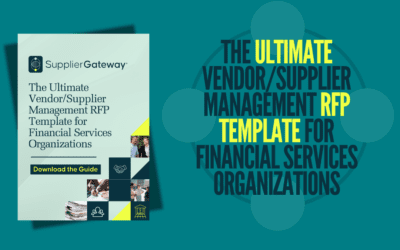Businesses must stay on top of their supply chain to maximize their time and expenses and turn them into profits. For many businesses, an efficient and streamlined relationship with suppliers can make a significant difference when it comes to productivity, profitability, and organization. In this case, supplier management plays a crucial role in their operations.
But what is supplier management, and how does it benefit business operations? Here’s a comprehensive look into supplier management and how Supplier Gateway can help businesses grow fruitful business relationships with their suppliers.
What Is Supplier Management?
According to Gartner, supplier management, also known as vendor management, is a discipline that enables organizations to control costs, drive service excellence and mitigate risks to gain increased value from their vendors throughout the deal life cycle.
Running a business or service requires having the necessary supplies. Unless a business creates everything in-house, it will need to outsource raw materials, products, or services from businesses that provide a steady supply of these materials. Not all suppliers offer the same level of quality when it comes to their products and services, however.
So what happens if a supplier’s materials do not meet a business’ standards, or what if their suppliers’ operations and level of service doesn’t align with a business’s strategy? This is where supplier management comes in.
Supplier management allows buyers to strategically monitor supplier performance and relate that performance to the company’s success and future growth. Being able to strategically monitor suppliers . can help determine whether or not a supplier is a suitable fit for a long-term business relationship.
Types of Supplier Relationships
The relationship between businesses and their suppliers can vary depending on their needs. These include:
- Buy the Market: A typical buyer-and-seller transaction that ends upon contractual fulfillment. No other communication outside of orders and fulfillment is necessary.
- Ongoing Relationship: When a supplier is chosen among other similar suppliers. There is a formal or informal relationship where a business has a partnership with its supplier.
- Strategic Alliance: A long-term relationship built on an exclusive arrangement where both the buyer and supplier work together. Both parties are incentivized to collaborate.
- Backward Integration: A relationship where either the supplier is owned by the organization or is under the same organization as the business. Technically, both the supplier and organization are part of the same umbrella.
Benefits of Supplier Management
Through an efficient supplier management system, businesses can stay on top of their relationships with various suppliers, improve productivity, and minimize the risks that can affect operations because of their suppliers. Some of the benefits include:
- Risk Reduction: Supplier management requires accurate supplier data. Having accurate and up-to-date supplier information reduces risks including financial, reputational, and compliance risk.
- Cost Reduction: Provides long-term, cost-effective strategies. For example, Vendor A offers raw materials at a lower price, but their unreliable delivery leads to downtime and decreased productivity. Supplier management allows businesses to consider all operational costs.
- Increased Efficiency: Supplier management helps to minimize delays in the supply chain and operational flow due to increased communication between suppliers and buyers. Having a supplier management system in place speeds up the onboarding process and makes operations smoother.
- Consistent Pricing: Building long-term relationships with suppliers can lead to discounted pricing and better supply terms for buyers. This can reduce costs while maintaining the product quality and maximizing profit.
Supplier Lifecycle Management
A typical supplier management process includes supplier lifecycle management and typically includes the following:
- Qualification: Identifying whether or not a certain supplier meets a buyer’s specific requirements. Only suppliers that fulfill specific requirements should be considered.
- Evaluation: Once a supplier has qualified, they should be assessed based on product quality, supply risk, customer reviews, performance, and any other criteria that are important to your company.
- Selection: Once the pool of eligible suppliers has been narrowed, a selection is made. The selection process often takes time due to its direct impact on the business. The ultimate goal in supplier selection is to select a supplier that shows maximum potential value and the want to form a long-term strategic relationship.
- Onboarding: This step requires collecting necessary information and documents that the company needs in order to have a supplier approved in the system.
- Supplier Performance: Supplier performance management helps buyers monitor suppliers and discover any issues before they become problems. Constantly monitoring supplier value and performance ensures that suppliers are adhering to any contractual obligations.
- Identifying Risk: Monitoring suppliers includes Identifying risk. will prevent unexpected events such as a breach of contract, late deliveries, low quality, etc. Risk management is critical and yet the most overlooked.
- Supplier Development: Businesses with strong collaborative relationships with their suppliers are more likely to grow faster than those who aren’t. Regularly sending feedback to supplies will help improve the process and manufacturing capabilities.
- Supplier Management: Cultivating a mutually beneficial relationship with your suppliers will give you a significant ROI and gain more competitive advantage and innovation, which results in reducing cost, lower risk and higher quality.
Supplier Management and Risk
Companies may be exposed to supplier risks. This could be due to interruptions, issues with the supply chain, and any other undesirable behavior that could affect an organization’s own operations. Risk can be divided into four main categories – each of which can be mitigated through a number of ways, including having a solid supplier management system in place.
1. Strategic and Financial Risks
A supplier with poor financial health can result in issues such as economic dependency and bankruptcy. This, in turn, can lead to issues down the line for organizations as their vendors do not have the means to fulfill their obligations. Organizations may be able to mitigate this by checking their suppliers’ financial health before partnering with them.
2. Contractual and Legal Risks
The risk of non-compliance, legal challenges, fraud, and other legal issues that could arise from the partnership. The business could be affected by this through their reputation from associating with their vendor or result in operational delays or lawsuits in case of any legal conflict.
3. Operational Risks
This is linked to the raw materials, supplies, and other services provided by the supplier. Quality issues or incomplete orders can cause delays or reduce the quality organizations can provide their own customers. This can also lead to operational delays, which could halt production and affect productivity within the organization.
4. Reputational Risks
If the supplier is linked to scandals or disasters, it could affect the reputation of the organization. There’s also the issue of organizations that stand for certain ethical, social, or environmental issues only to partner with suppliers that don’t follow the same stance. Knowing the reputation of the supplier can mitigate issues like these.
What Challenges Do Supplier Management Solve?
Through the right supplier management procedures, businesses can overcome a number of challenges that are common when dealing with procurement and supply chain management:
- Communication and Transparency: Suppliers should align with a business’ demands, requirements, and strategic goals. Otherwise, the organization’s demands may remain unfulfilled, which can affect the business’s ability to produce its own goods and services.
- Unavailable Products or Services From a Supplier: Suppliers have more than one client , which means the risk of unavailability. This can cause delays and shortages that can affect the organization’s productivity and can hurt the working relationship.
- Contract Conflicts: Issues such as missing or incorrect documents can affect both parties and lead to legal issues down the line. Through supplier management, both the vendor and the organization are aware of the terms of their relationship.
Supplier Risk Management: How Software Can Reduce Risk
Software platforms designed for supplier management can simplify a business’ processes. SupplierGateway’s Enterprise Supplier Master Data Management Platform helps reduce risk and save time in the following areas:
- Supplier Onboarding: Organizations can spend less time with the onboarding process while collecting the necessary supplier data and documentation. This means less time waiting for documents that can help businesses make decisions when choosing their suppliers and having the means to make well-informed decisions about partnering with suppliers.
- Supplier Compliance Monitoring: Ensure suppliers and vendors are adhering to industry compliance practices that protect both parties. This can include insurance coverage, certifications, and other compliance data that’s necessary within their industry.
- Financial and Legal Risk Monitoring: Businesses can reduce their liability, financial risk, and reputation by getting automatic alerts on any suppliers’ financial and legal status that could affect their own operations.
How Does SupplierGatewayMinimize Supplier Risk?
With all-in-one supplier data management software, businesses can keep their suppliers in check using a well-designed platform that houses all necessary supplier data. Software like SupplierGateway’s Enterprise Supplier Data Management Platformis designed to source suppliers, track productivity and KPIs, and reduce the risk suppliers can have on your business without the added costs.
Some of the benefits of working with a reliable supplier management platform like SupplierGateway’s include:
- Faster Onboarding: Onboarding suppliers in hours rather than weeks.
- Centralized Data: Have one database for all supplier data that suppliers can update themselves.
- Accurate Reporting: Get accurate data and time-saving category reports that can help measure productivity and spending.
- Convenient Sourcing: Businesses can easily find suppliers, manage bids, and handle all payments within one platform.
Efficient Supplier Information Management Software from Supplier Gateway
Maximize your productivity and procurement costs with the all-in-one platform for your supplier management needs. With Supplier Gateway, you can make your supplier data work for you while minimizing risk and improving your relationships with your suppliers.
Get in touch with us today to request a demo of our platform.












